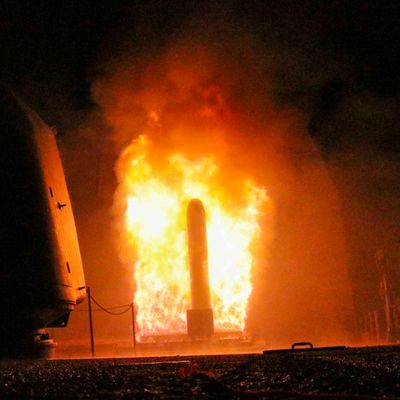
The air strikes carried out in Syria Friday night by the U.S., the U.K., and France were supposed to serve as a stern warning to Bashar al-Assad that any further use of chemical weapons by his government would be met with severe reciprocity.
Yet on Sunday, the Washington Post reported, Assad was in a good mood, yukking it up with Russian lawmakers, dissing American military power, and celebrating his victory over rebels in the Damascus suburb of Douma, where the alleged chemical attack that occasioned the coalition strikes did just what it was intended to do.
The Trump administration has characterized its intervention as an example of the U.S. setting “red lines” and enforcing them, in contrast to former President Barack Obama’s waffling. Yet by drawing these red lines around specific atrocities of which the West does not approve, the U.S. and its allies may only be delineating more concretely which other atrocities the Syrian dictator can get away with. Barrel bombs, which his army has also repeatedly and infamously dumped on civilian populations over the past seven years, can be just as terrifying and destructive as chlorine gas.
Furthermore, our missiles did not put Assad’s entire chemical weapons program out of commission, and what’s left is quickly being shuffled into the same locations as Russian military personnel and assets, which we can’t bomb without risking a catastrophic confrontation with another nuclear superpower.
All the strikes appear to have accomplished, beyond making President Donald Trump feel better about himself as prosecutorial buzzards circle his closest cronies, is to commit the U.S. to future involvement in a foreign quagmire the Obama administration was rightly hesitant to enter (and which Trump just weeks ago said we were about to leave). The next time Assad uses chemical weapons — which he surely will, because he already knows how this sentence ends — Trump will have no choice but to launch another attack, probably a larger one, yet again risking conflict with Russia for the sake of achieving dubious military objectives.
If this event underscores the absence of this administration’s Syria strategy, it also shows that there really is no strategy to be had. There is almost nothing the United States can do, militarily, to meaningfully influence the outcome of the Syrian civil war short of a full-on, Iraq-style invasion, which would carry intolerable costs and risks.
The solution to the manifold problems in Syria may not lie with the military at all; it certainly is not coming from the Pentagon. Obama may have missed an opportunity to intervene constructively in 2012, but then as now, Russia’s interests in Syria were much stronger than ours and the inherent risks of confrontation with Moscow were significant. If there is anything American leadership can do for Syria at this point, it involves brokering a long, difficult, frustrating diplomatic process with people who hate each other and in many cases hate us as well.
Yet the futility of this weekend’s air strikes speaks also to a larger failure of imagination in American foreign policy in the post–Cold War era. Perhaps as a result of the drift of leadership in this area from the State Department to the Pentagon and the CIA, the U.S. has developed a delusion that it can make a difference in the world with missile strikes and arms shipments alone, despite a growing body (or as it were, body count) of evidence to the contrary.
Let’s look at the tape: The U.S. has been providing arms and air support to Syrian rebels on and off for several years now, to no avail. We have been drone-bombing Pakistan for a decade and a half to root out a terrorist element that somehow keeps growing back. We have been doing the same thing, with the same effect, in Somalia for over ten years. The no-fly zones and bombing campaigns in Iraq throughout the 1990s did nothing to alter Saddam Hussein’s behavior. In all of these cases, our interventions engendered more resentment than gratitude.
The only example in recent history of a U.S.-led bombing campaign that actually changed the course of a foreign war was the 2011 intervention in Libya, and while there is a case to be made that this intervention prevented Muammar Qaddafi, from carrying out the mass murder of innocent civilians, it also contributed to the destabilization of West Africa and two civil wars, the second of which is ongoing even though it has dropped almost completely out of international headlines.
Indeed, the last time the U.S.-led bombings of a foreign villain contributed to a clearly positive outcome was the NATO intervention in the Bosnian War in 1994–1995 — a campaign in which the enemy had no powerful backers and which was carried out to support a U.N.-sponsored peace process.
Since then, however, our track record has been pretty abysmal.
What both neoconservative ideology and the liberal-internationalist doctrine of “Responsibility to Protect” overlook is that the targeted application of American hard power can only go so far toward solving the world’s ills. No matter how precisely and thoughtfully we aim our missiles, and no matter how consistently we enforce our red lines, some adversaries simply will not be bombed into submission. If the U.S. hopes to act as a global leader and a defender of freedom and justice in this century, it needs to find a better way of responding to rogue states and non-state actors around the world.





























